Threat of capitalist restoration accelerates
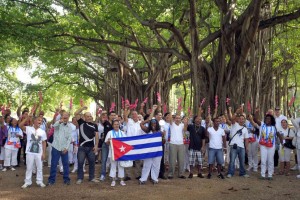
As 2014 drew to a close, 2015 was ushered in by U.S. President Obama and Cuba’s Raúl Castro announcing a series of historic agreements. These restored diplomatic relations between the two countries, relaxed travel restrictions and took the first steps towards the easing of the trade embargo which had been imposed since the revolution in 1959-60. The release of prisoners held by the Cuban regime, including U.S. nationals, and Cubans held in the U.S. has already taken place.
This step represents a decisive shift in the policy of U.S. imperialism towards Cuba. It also signifies a further qualitative step by the Cuban regime towards capitalist restoration. The latter has been unfolding for a number of years. These announcements are the culmination of secretive talks between the two governments which have been taking place in Canada for a number of years. Negotiations involving the right-wing Canadian government and the Pope have been crucial in brokering the current agreement.
Obama made these announcements recognizing that “You cannot keep doing the same thing (for more than 50 years) and expect a different result.” The European ruling classes, Canadian and much of Latin American capitalism took a different approach – one which Obama has now adopted.
Raúl Castro made the announcement and urged that Obama be awarded the Nobel Peace Prize! As U.S. president he has carried out more drone attacks than George Bush!
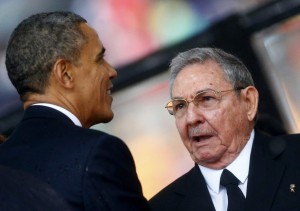
Since the Cuban revolution in 1959-60, U.S. imperialism has enacted a strict embargo and undertaken various attempts – including armed intervention in 1961 – to overthrow the Cuban regime and restore capitalism. Despite the crippling consequences of the embargo, estimated to have cost the Cuban economy US$1 trillion since its enforcement, this policy has failed. This was mainly due to the deep social roots and support for the revolution which existed. It was a policy which was also geared to winning the political support of the Miami Cuban exiles who had fled from the revolution.
Now U.S. imperialism is adopting a new policy of beginning to lift the embargo. The threat of capitalist restoration to an isolated workers’ state can come not only from the threat of military intervention. As Trotsky warned in relation to the former USSR, it can come in the form of “cheap goods in the baggage train of imperialism”. The objective of U.S. imperialism is the same but now they hope to reach it by a different route. They intend to flood the Cuban economy with goods and investment with the objective of fully restoring capitalism.
Change of U.S. imperialist policy
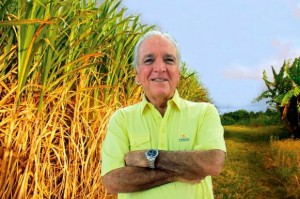
This change of policy by U.S. imperialism has been facilitated by a generational change and outlook within the exiled Cuban community. While previously wedded to support for the embargo and a struggle to overthrow the regime now, according to some opinion polls, 52% of Cubans living in the USA now support ending the embargo. Sections of the capitalist class, like the sugar magnate Alfy Fanjul, have pronounced in favor of lifting the embargo, eyeing the prospects of new markets within a capitalist Cuba.
The devastating economic situation in Cuba means many Cubans are dependent on remittances they receive from families in the USA. An estimated 62% of Cuban households now receive support from abroad. According to some economic estimates, they sustain an incredible 90% of the retail market.
The dire economic situation in Cuba has meant a disastrous situation for the masses. The massive social gains conquered as a result of the revolution and overthrow of capitalism have been eroded, particularly since the collapse of the former USSR. Support for the revolution and hostility to capitalism and U.S. imperialism meant that the Cuban regime, incredibly, was able to maintain the planned economy and bureaucratic regime throughout the 1990s (the ‘Special Period’) and into the early part of the 21st century. The value of wages in Cuba today is estimated to be worth only 28% of that prior to the collapse of the former USSR.
Yet the regime and planned economy hung on through this period despite the tidal wave of free market capitalism which dominated the world economy in this period. The regime was also able to sustain itself politically using the U.S. embargo which fueled hostility to U.S. imperialism. The arrival of Hugo Chavez to power in Venezuela also brought it breathing space through its supply of cheap petrol and oil.
Workers’ control and democracy
The lack of genuine workers’ control and democracy and the consequential bureaucratic mismanagement and corruption further dogged and aggravated the economic and social crisis caused by the embargo and isolation.
The revolutionary convulsions which swept Venezuela, Bolivia, and Ecuador at the beginning of the century offered the prospect of Cuba breaking out of its isolation. A genuine workers’ democracy would have seized this opportunity and taken the steps necessary to try and form a socialist federation of these countries. This could have allowed economic co-operation and planning between these countries and could have begun to appeal to the working class of the whole of Latin America by offering an alternative to capitalism.
However, unfortunately, neither the Cuban bureaucratic regime nor the reformist leaderships of Morales, Chavez and Correa were prepared to take this step. The latter have remained trapped within capitalism despite initially introducing reforms and taking some measures to encroach on the interests of the ruling class and imperialism. The Cuban regime, on the other hand, introduced a series of incremental steps beginning the process of capitalist restoration. These latest developments suggest a further step in this process.
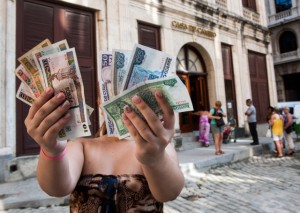
Although the easing on travel restrictions will be welcomed, other steps represent a threat to the remaining gains conquered by the revolution. These were already being eroded and dismantled. Any that remain are now under serious threat. The new labor code represents a serious attack on workers’ rights. The age of retirement was raised by five years in 2008. The introduction of the ‘dual currency’ exchange, whereby some workers are now paid in dollars, vastly exacerbated inequality between those paid in dollars and those in pesos. The regime created the ’convertible peso’ (CUC) that is pegged at 1:1 with the dollar, which is used in the tourist sector and for imported products. Local products use the local peso (CUP) which is equal to about 1:25 of the CUC. The government announced its intention to scrap this dual currency but this has not so far been implemented.
This has inevitably boosted the black market. The government established a target of removing over one million workers from the state sector and allowing the establishment of thousands of small and medium sized businesses; 500,000 licenses have already been issued to ‘cuentapropistas’. However, these have centered on small businesses like restaurants. The number of workers employed in the private sector has increased from approximately 140,000 to 400,000 since 2007. This is significant but still a minority out of a total work force of over five million.
A bridgehead for capitalist restoration has been developed in the tourist sector, which has been the center thus far of foreign investment from European, Canadian, Brazilian and, more recently, Chinese enterprises. Prostitution, banished from society following the revolution, is now back on the streets of Havana, especially in the tourist areas.
Special Development Zones have been opened like the building of a new port facility in Mariel Bay – financed by investment from Brazilian and Singaporean capitalism. This is view with a future eye for the ending of the US trade embargo and also to capitalize on the expansion of the Panama Canal and the new canal being planned in Nicaragua. Here, investors will be given 50-year contracts compared to the current 25-year one. Investors can have 100% ownership. They will be charged no labor or local taxes and granted a 10-year reprieve from paying a 12% tax on profits.
However, despite these developments, foreign investors are compelled to negotiate with the government or state-run companies. While the Cuban regime still uses some socialist rhetoric, in part reflecting the support which still exists for the revolution, especially among the older generation, it increasingly refers to Jose Marti, the leader of the independence movement against the Spanish colonizers.
The younger generation, desperate to enjoy new freedoms – use of the internet and international travel among others – have experienced not the gains but the regression of the revolution, economic and social crisis and the stifling dead hand of the bureaucracy
Initially, the attraction of the arrival of “cheap goods in the baggage train of imperialism” may hold an initial attraction until the reality of life in capitalist society becomes apparent.
Moves towards re-introduction of capitalism
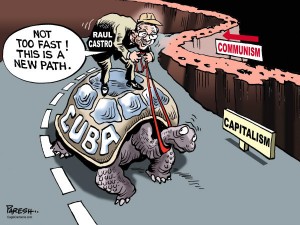
These developments clearly represent an important move towards the re-introduction of capitalism. This is underway in some sectors but under continued state supervision and agreement. The state still maintains powerful control and could choke off these steps at a certain stage. Foreign investors still need to negotiate directly with the government or state-controlled companies. The decisive sectors of the economy have still not been privatized or sold to foreign capitalists.
For socialists and the working class, the steps towards capitalist restoration represent a backward step. They will signify the erosion of the gains of the Cuban revolution for the masses. They will also be utilized by the ruling class, especially in Latin America, to try and again discredit the idea of socialism as an alternative to capitalism.
However, this will not have the same effects as the ideological offensive against the idea of socialism, which the ruling class unleashed following the collapse of the former Stalinist regimes in the ex-USSR and Eastern Europe. A new phase of capitalist crisis and workers’ struggles has opened up internationally. The working class and the masses have passed through twenty-five years of the ‘supremacy of the free market’ and are beginning to struggle against it. In Brazil, Argentina, Chile, and other countries, a new cycle of workers’ struggle has begun.
The lifting of the embargo represents a defeat for the past policy of U.S. imperialism and its attempt to overthrow the Cuban regime. It will give Cuba the opportunity to trade on the world market. However, without the existence of a genuine workers’ democracy, this includes the danger that can accelerate the process of capitalist restoration. A state monopoly of foreign trade, controlled by a genuine regime of workers’ democracy, is essential to help prevent this increasing threat. Socialists welcome the increased freedom to travel.
International capitalist crisis
The transition to a full capitalist restoration in Cuba however will not be a straightforward uninterrupted process. Sections of the regime do not seem to want to go in this direction. Significantly, Mariela Castro, daughter of Raúl, firmly stated as this deal was announced that the people of Cuba “do not want to return to capitalism”.
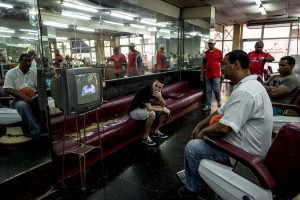
Under the conditions of new international capitalist crisis, moves towards capitalist restoration can be checked. A mixed or hybrid situation could continue for some time. Initially, such gains from the revolution, such as healthcare and the education system, may be maintained, although even these have suffered greatly from lack of investment in the recent period. Many obstacles remain to be overcome and some resistance is likely as the reality of capitalist restoration becomes apparent. Sections of the population are already fearful of losing the gains of the revolution and of Cuba being turned into another Puerto Rico.
The need to build resistance to the developing pace of capitalist restoration, and struggle for genuine workers’ democracy and a nationalized planned economy in Cuba is more urgent that ever. Such a movement could link together with the working class and youth throughout Latin America, who are increasingly moving into struggle to defend their interests, and begin to offer a real socialist alternative to capitalism that has fully learnt the lessons of the Cuban revolution.


